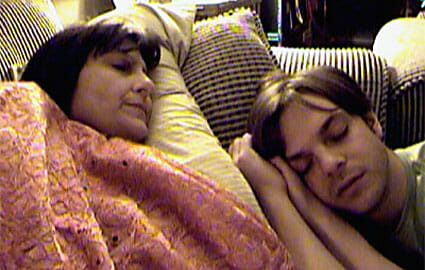
In 1973, influential filmmaker Jean Rouch wryly explained why he made documentaries about vanishing cultures: “Why do I take the camera among mankind? My first response will always, strangely, be the same: ‘For me.’” Trained as an anthropologist, Rouch had more reasons than that, but his statement was honest and philosophical. “Film,” he added, “is the only means I have to show someone else how I see him.” In the 1950s his embrace of new technology—portable cameras and audio equipment—helped Rouch stand on the shoulders of Robert Flaherty (Nanook of the North) and Dziga Vertov (The Man with the Movie Camera), innovators who recognized in cinema’s earliest days that a camera can break down barriers between people, a little machine capturing bits of truth.
Born in Houston, a year before Rouch made this statement, Jonathan Caouette grew up with a camera at his side, and he clung to it like a security blanket through his family’s dark nights. Tarnation, the 90-minute film he extracted from two decades of footage, attempts to untangle his complicated past, reaching for the elusive truth. It’s his own story—he was a troubled child with abusive foster parents, a boy who made slasher movies with his friends and partied at adult clubs when he was a teen—but it’s also the story of his mother and her mental illness, and the story of his grandparents who raised him during his mother’s extended hospital stays. Caouette seems like he’s coming up for air after a long, breathless struggle; Tarnation is his testament of survival.
The promise of personal video is that it’ll put the power of moving images into the hands—and homes—of ordinary people. It’s another frontier opened by technology, a place cameras have, until now, been too bulky or foreign to go unnoticed. Albert Brooks poked fun at the attempts to film domestic spaces in his hilarious first movie, Real Life, where men with cameras mounted on their heads lurk around Charles Grodin’s dinner table as he tries to carry on a “normal” conversation with his family. But, since then, cameras have become as familiar as lampshades in many American homes. And for kids like Jonathan, the camera is now a substitute for a leather-bound diary, trusty and worn, a keeper of secrets.
Although Tarnation foreshadows a new era of personal filmmaking, it doesn’t necessarily herald the coming of a great filmmaker. Caouette’s 90 minutes are a jumbled mass of images, aligned in arbitrary grids and edited with little grace. Maybe the high-volume, monotonous pace mirrors Caouette’s inability to order his life and his tendency toward melodrama, but his movie would benefit from a keener, more curious eye. Instead of using the grammar of cinema to tell his story, he relies on pages of scrolling text that read like the piteous scribbles of a teenager holed up in his room with the stereo blasting.
Granted, young Jonathan had plenty to be woeful about, but the movie is best when it slips quietly into the pockets between his family’s dramatic episodes, showing Caouette’s natural, spooky talent for acting in the process. A monologue he delivers when he’s 12 years old—playing the part of a battered housewife—is as riveting as it is disturbing. He’s acting for an audience of one, his camera, and although it’s not the kind of scene that would be the heart of most movies, it’s the heart of this one. At that moment Tarnation is tensely electric—on the verge of fulfilling its promise by tapping into an unexplored vein of human experience.
But today’s Caouette is at the mercy of his flair for drama, as he eventually abandons intimacy, catering instead to a new audience raised on ambush journalism and televised domestic disputes. When he confronts his family or puts them in awkward situations for the sake of a scene, the movie feels simply conventional. It’s no longer “for me” or even “for us” but all too eager to evoke pity in an unseen third party; it’s “for you,” the audience, who expects an emotional rollercoaster.
The video revolution may indeed be televised, and the truth may be streamed at so many bits per second, but technology alone won’t be enough. It’ll require filmmakers sensitive to the needs of images so intimate they can either crush or be crushed, so tenuously powerful they’re devastating only until someone tries to make them more so. Caouette’s life is filled with extraordinary experiences, but extraordinary experiences are nothing new to film. The ordinary ones, the ones the tiny, ubiquitous cameras have the greatest potential to reveal, remain, for the time being, fleeting.